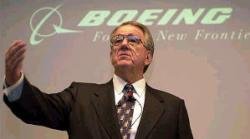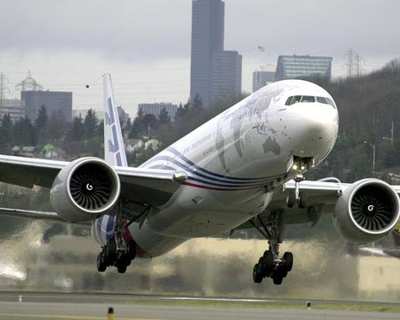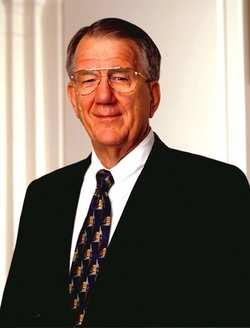Another Casualty In The Ongoing Boeing Morality Play
by ANN Senior Correspondent Kevin R.C. "Hognose" O'Brien
 A bad run of publicity for Boeing
executives has just gotten worse with Chief Executive Harry
Stonecipher being asked for, and delivering, his resignation due to
"a personal relationship between Stonecipher and a female executive
of the company." James A. Bell, CFO, has stepped in as interim CEO.
The board has stated that Bell, a three-decade Boeing veteran, is
not a candidate for a permanent CEO, and a search has begun.
A bad run of publicity for Boeing
executives has just gotten worse with Chief Executive Harry
Stonecipher being asked for, and delivering, his resignation due to
"a personal relationship between Stonecipher and a female executive
of the company." James A. Bell, CFO, has stepped in as interim CEO.
The board has stated that Bell, a three-decade Boeing veteran, is
not a candidate for a permanent CEO, and a search has begun.
Stonecipher has also resigned from the Boeing board. Board
chairman Lew Platt is expected to take a larger role in day-to-day
operations. "The board concluded that the facts reflected poorly on
Harry's judgment and would impair his ability to lead the company,"
Platt was quoted as saying. Stonecipher, who came to Boeing from
McDonnell Douglas in 1997 and headed the company until 2002, was
called back to the top job in 2003, ironically enough, to restore
the appearance of integrity to the company after the 767 tanker
scandal which ultimately landed contracting VP Darleen Druyun and
CFO Mike Sears in Federal prison and forced CEO Phil Condit to
resign, which followed on the heels of the purloined Lockheed
Martin satellite-launch bid documents scandal. Now we have a
corporate personal-appetites-governance scandal.
Ironically, one of Stonecipher's last public appearances as
Boeing CEO was at the rollout of the first 767 Tanker on Feb. 24th
in Wichita. That machine and its three sisters are destined for the
Italian air force; Boeing has also promoted the machine [see file
art] to other allies such as Japan. The implacable opposition of
Sen. John McCain makes it unlikely that the USAF will acquire such
planes anytime soon; Washington's own senators are ineffective on
this issue, being generally opposed to the military and to defense
spending (the airframes are built in Washington and only completed
in Wichita).
Market analysts were bullish on Boeing under Stonecipher, whom
they credit with Boeing's increased visibility and sales of late.
Boeing shares have been trading at 52-week highs; after this
announcement, shares lost almost $1 in pre-opening trading, but
within an hour of market opening most of that had been recovered;
the market seems equally bullish on Boeing without Stonecipher.
Stonecipher was not well liked by Boeing employees, and news
stories often called him, in quotes, "the most hated man at
Boeing." His 1997-2002 regime saw on-again, off-again jetliner
projects (at the time, Stonecipher opposed both the Sonic Cruiser
and the 7E7/787), the quixotic distraction of the headquarters move
to Chicago, mismanagement of labor that led to a militant strike by
mild, pocket-protector-wearing engineers, and massive losses and
layoffs. It was during that period that the groundwork was laid for
the dual problems that would bedevil Condit: the dithering product
management that allowed Boeing to lose a commanding sales lead to
Airbus, and the loose ethics whose repercussions are still
echoing.

Boeing responded to the drum fire scandals by adding a Vice
President of Ethics, Martha Ries; one of Stonecipher's first acts
on returning was to make all 158,000 Boeing employees sign an
ethics pledge. But these band-aids seem to have been directed at
managing outside-the-firm perception rather than correcting
corporate culture.
Workers and retirees did not welcome Stonecipher's 2003 return
-- "It looks like the company is coming unglued," retired VP of
engineering Bob Withington, one of the designers of the B-52, said
at the time. But Stonecipher tried to extend an olive branch,
noting that the employees in the commercial airplane branch of the
company "had done great things" under Phil Condit. "I'm so proud of
what they have accomplished during this sour market," he told a P-I
reporter, and sent a message to Boeing's unions, "We're in it
together, and ought to be able to succeed together." But he was
unable to win the trust of the unions, and contract negotiations
are coming in 2005.
One thing that may change with Stonecipher gone is Boeing's
corporate relocation to Chicago, which was driven all along,
against all business sense, by Stonecipher's personal antipathy to
Seattle. As the Seattle P-I's Bill Virgin noted, he left the city
fathers convinced that he held "less than favorable view[s] of the
Puget Sound region; as one civic leader said recently, 'He
hated this place.'"
The Prediction of the Year award goes to analyst Richard
Aboulafia, of the Teal Group, who told the King County, WA, Journal
on Stonecipher's return in December, 2003, that "if Stonecipher
remains more than a year or so, 'he could easily outstay his
welcome.'" Stonecipher's run was fifteen months.
During his tenure at McDonnell Douglas, prior to coming to
Boeing, Stonecipher cut so many development and manufacturing jobs
that the only way out at the end was to sell a crippled company
that could no longer design and build modern jets. With
Stonecipher's departure from Boeing, the last vestige of Boeing's
purchase of McDonnell Douglas, an all-around disaster, is gone.
Prior to that, at General Electric, Stonecipher appears to have had
some involvement in a scandal involving an offshore captive
insurance company, Electric Mutual or EMLICO, which went paws up
leaving the public stuck with about a half-billion dollars in GE
asbestos liability.
 The Boeing press statement, and an
internal Boeing email, a portion of which was obtained by
Aero-News, pointed out that the executive in question did not
report directly to Stonecipher, whose age is variously reported as
68 or 69 and is married with children and grandchildren, and that
the relationship was consensual. (OK, so she reported to somebody
that reported, ultimately, to Stonecipher. Aero-News notes that
Monica Lewinsky didn't report directly to President Clinton either,
but for some reason the president chose to have a "personal
relationship" with her and not direct-reporter Madeline Albright.
Go figure). The relationship appears to have been conducted
clandestinely and was exposed to the board by an anonymous
tipster.
The Boeing press statement, and an
internal Boeing email, a portion of which was obtained by
Aero-News, pointed out that the executive in question did not
report directly to Stonecipher, whose age is variously reported as
68 or 69 and is married with children and grandchildren, and that
the relationship was consensual. (OK, so she reported to somebody
that reported, ultimately, to Stonecipher. Aero-News notes that
Monica Lewinsky didn't report directly to President Clinton either,
but for some reason the president chose to have a "personal
relationship" with her and not direct-reporter Madeline Albright.
Go figure). The relationship appears to have been conducted
clandestinely and was exposed to the board by an anonymous
tipster.
The female executive, who is reportedly also married (not to
Stonecipher, obviously), and decades younger than Stonecipher, was
not named. According to Boeing the affair did not affect the career
or compensation of the woman, and she, unlike Stonecipher, has not
been asked to resign. This is another example of corporate trimming
that offsets all the pretense of Ethics Pledges and VP's of
Ethics.
James A. Bell is expected to retire at Boeing's mandatory
retirement age of 65, which was waived -- twice -- for Stonecipher.
Now interim President and CEO as well as CFO, Bell is a lifelong
veteran of the aerospace industry, who joined Rockwell fresh from
Cal State-LA in 1972 with an accounting degree in hand, and has
served Boeing for 32 years. An interesting sidelight in Bell's
corporate biography is that he serves on several boards, including
one undertaking that may properly represent what he'll have to do
as CEO of one of the world's most public companies: the Joffrey
Ballet. At least in the short-term, it appears Bell will have to
step very, very carefully.
 Aero-News: Quote of the Day (12.09.25)
Aero-News: Quote of the Day (12.09.25) ANN's Daily Aero-Term (12.09.25): High Speed Taxiway
ANN's Daily Aero-Term (12.09.25): High Speed Taxiway ANN's Daily Aero-Linx (12.09.25)
ANN's Daily Aero-Linx (12.09.25) NTSB Final Report: Diamond Aircraft Ind Inc DA20C1 (A1); Robinson Helicopter R44
NTSB Final Report: Diamond Aircraft Ind Inc DA20C1 (A1); Robinson Helicopter R44 ANN FAQ: Q&A 101
ANN FAQ: Q&A 101





